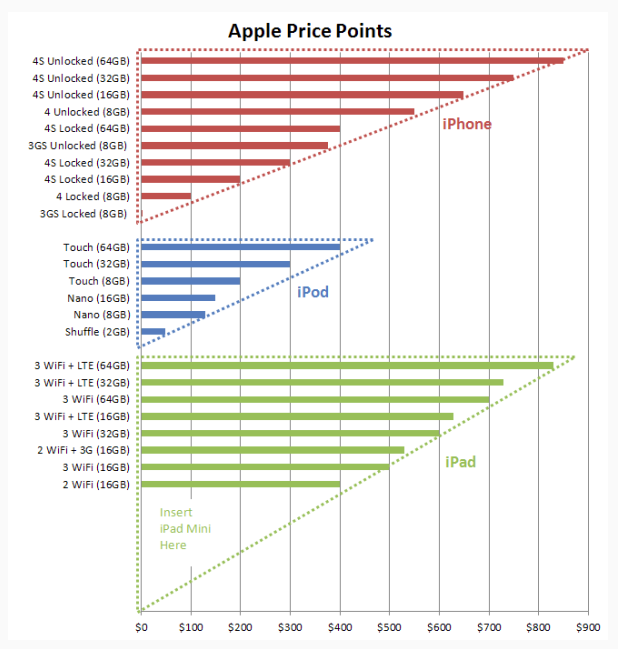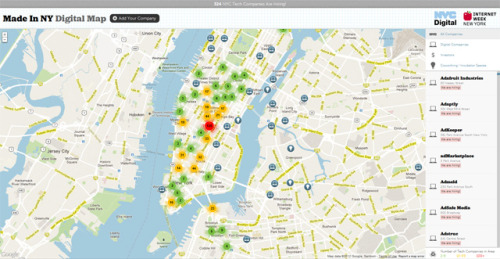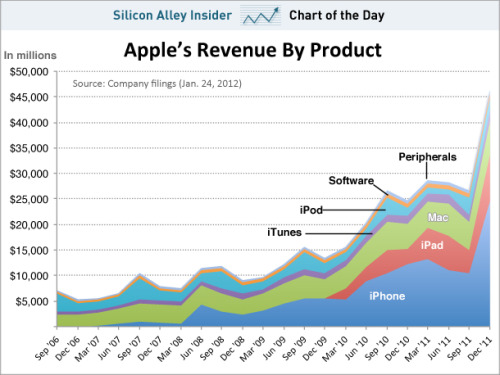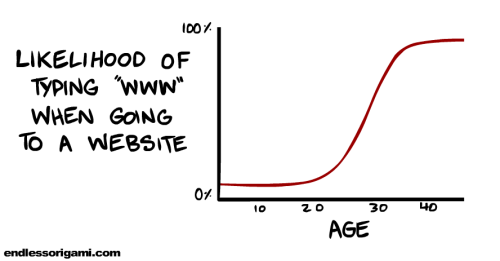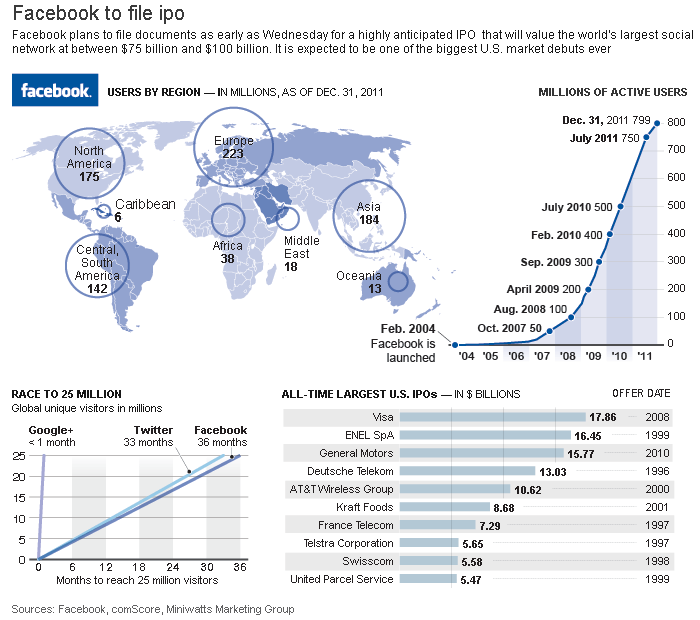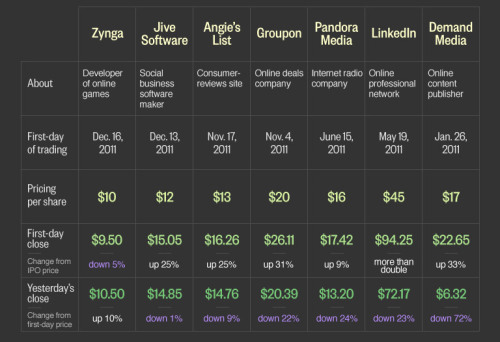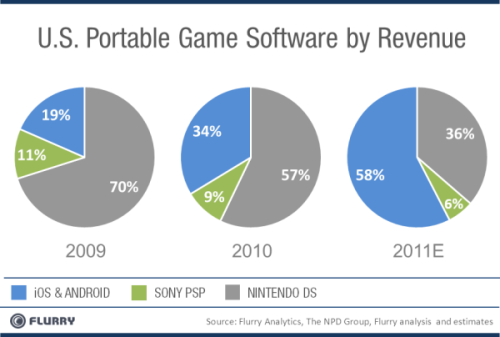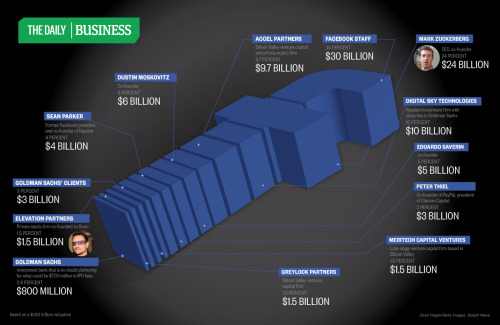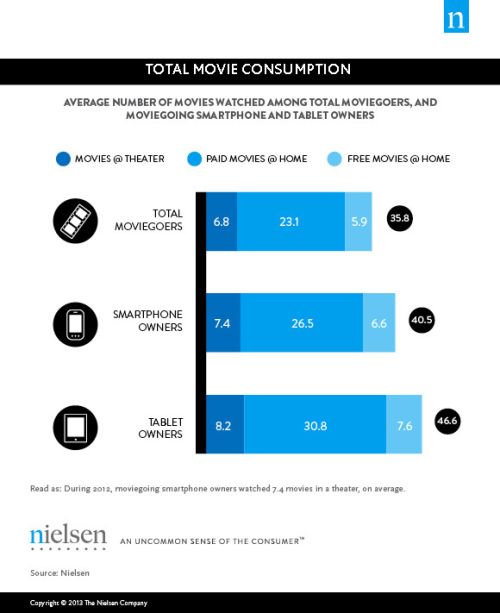
Showing posts with label business. Show all posts
Showing posts with label business. Show all posts
Tuesday, February 12, 2013
Infographic: Total Movie Consumption
Wednesday, September 19, 2012
Tech: Baxter Manufacturing Robot
Baxter is a new manufacturing robot designed to perform repetitive tasks normally done by unskilled labor while working "elbow-to-elbow" with human coworkers. Sonar and cameras allow the robot to detect humans in order avoid colliding with them. What's more, Baxter doesn't need to be programmed. He can be trained by simply walking him through the motion required to complete a new task. The hope is that Baxter's relatively low cost (US$22,000) will provide small business with an alternative to offshore manufacturing.
Thursday, August 2, 2012
Business: Google’s Quirky New London HQ
Google’s Quirky New London HQ: Fit For Mr. Bean:
The search giant is known for its playful, unconventional workspaces—perhaps intended to offset its fairly Vader-esque public image, and certainly, to sweeten the deal for young, in-demand engineers who may be juggling other offers. In Pittsburgh, Googlers enjoy an industrial theme and slides. In Zurich, it’s birch trees and meeting cocoons. Meanwhile, in London, Google has two established offices—one is industrial chic, the other, a space-age white box. Now, a third office—a “Super HQ”—has opened on the eighth floor of Central Saint Giles, the Renzo Piano-designed tower in Covent Garden.Source: Fastcodesign.com
Friday, July 27, 2012
Business: The Reason for the iPad Mini
The Reason for the iPad Mini:
On a past Apple conference call, Tim Cook said "one thing we'll make sure is that we don't leave a price umbrella for people". What's that? A price umbrella is when a company with dominant market share maintains high prices, leaving an opening for new competitors to enter at lower price points. In the case of the iPad, the price umbrella until recently was at $499. Someone could enter that market at lower prices and exhibit classic disruption to push them out from the bottom up.Source: iamconcise
Apple has already solved this problem twice, with the iPod and iPhone. So let's look at what they did.
Monday, July 2, 2012
Snippet: Your E-Book Is Reading You
Your E-Book Is Reading You:
Source: WSJ.com
For centuries, reading has largely been a solitary and private act, an intimate exchange between the reader and the words on the page. But the rise of digital books has prompted a profound shift in the way we read, transforming the activity into something measurable and quasi-public. The major new players in e-book publishing—Amazon, Apple and Google—can easily track how far readers are getting in books, how long they spend reading them and which search terms they use to find books. Book apps for tablets like the iPad, Kindle Fire and Nook record how many times readers open the app and how much time they spend reading. Retailers and some publishers are beginning to sift through the data, gaining unprecedented insight into how people engage with books.
Barnes & Noble has determined, through analyzing Nook data, that nonfiction books tend to be read in fits and starts, while novels are generally read straight through, and that nonfiction books, particularly long ones, tend to get dropped earlier. Science-fiction, romance and crime-fiction fans often read more books more quickly than readers of literary fiction do, and finish most of the books they start. Readers of literary fiction quit books more often and tend skip around between books.
Pinpointing the moment when readers get bored could also help publishers create splashier digital editions by adding a video, a Web link or other multimedia features, Mr. Hilt says. Publishers might be able to determine when interest in a fiction series is flagging if readers who bought and finished the first two books quickly suddenly slow down or quit reading later books in the series.
“The bigger trend we’re trying to unearth is where are those drop-offs in certain kinds of books, and what can we do with publishers to prevent that?” Mr. Hilt says. “If we can help authors create even better books than they create today, it’s a win for everybody.”
Thursday, June 21, 2012
Business: Surface vs iPad Announcement
Source: ReadWriteWeb
On Monday, Microsoft held a secret press event in Los Angeles where it announced a new family of tablets under the Surface moniker. Along with Surface, the event revealed a branding shift for Microsoft, one that values the unity of hardware and software, and the idolization of aesthetics. Something about it felt familiar...
Tuesday, May 29, 2012
Business: Emart Shadow QR Code
To increase sales during lunch hour, Emart in Korea set up a QR code that is only scannable from 12:00 to 1:00 pm when its shadows complete the black and white pattern.
Friday, May 18, 2012
OpEd: The Third Industrial Revolution
The Third Industrial Revolution:
3D printing, and other rapid prototyping technologies combined with intelligent software are described by Paul Markillie of the Economist as drivers of a third industrial revolution. Jeremy Rifkin also uses the term and both writers point to the new rise of decentralized, global and individualized manufacturing and economic systems now coming on stream. Rifkin’s The Third Industrial Revolution explores how Internet technology and renewable energy are merging factors in the future too.
Everything in the factories of the future will be run by intelligent software systems. Digitisation in manufacturing will have a disruptive effect every bit as big as in other industries that have gone digital, such as office equipment, telecommunications, photography, music, publishing and films.
The effects will not be confined to large manufacturers; they will need to watch out because much of what is coming will empower small and medium-sized firms and individual entrepreneurs. Launching novel products will become easier and cheaper. Communities offering 3D printing and other production services that are a bit like Facebook are already forming online—a new phenomenon which Markillie calls social manufacturing.Source: 33rd Square
As manufacturing goes digital, a third great change is now gathering pace. It will allow things to be made economically in much smaller numbers, more flexibly and with a much lower input of labour, thanks to new materials, completely new processes such as 3D printing, easy-to-use robots and new collaborative manufacturing services available online. The wheel is almost coming full circle, turning away from mass manufacturing and towards much more individualised production. And that in turn could bring some of the jobs back to rich countries that long ago lost them to the developing nations.
Wednesday, May 16, 2012
Net: Made in NY
Yesterday, at Internet Week New York, New York City Mayor Michael R. Bloomberg, Chief Digital Officer Rachel Sterne, and Internet Week New York Chairman David-Michel Davies launched the “Made in NY” Digital Jobs Map, "an interactive guide to the City’s startups, investors, incubators, and coworking spaces, including over 325 digital companies that are currently hiring for thousands of jobs."
Created by Internet Week New York in partnership with the Mayor’s Office of Media and Entertainment and the New York City Economic Development Corporation, the Made in NY Digital Map already plots more than 500 digital companies across the five boroughs. The map offers direct links to the companies’ jobs listings pages and pinpoints the city’s hottest tech hubs, from the Flatiron District to DUMBO. The Mayor made the announcement at Internet Week headquarters and was also joined by Economic Development Corporation President Seth Pinsky and Branch CEO Josh Miller.
…The Made in NY Map draws its data from sources including NYC Digital, New York City Economic Development Corporation, Internet Week New York, New York Tech Meetup, and user-generated submissions.
Monday, May 14, 2012
Tech: Smartphones Spreading Fast
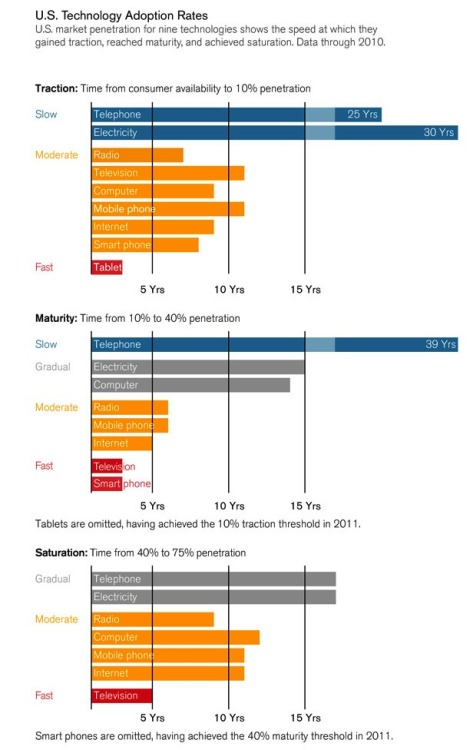
Are Smart Phones Spreading Faster than Any Technology in Human History?
Source: Technology Review
“These figures show that smart phones, after a relatively fast start, have also outpaced nearly any comparable technology in the leap to mainstream use. It took landline telephones about 45 years to get from 5% to 50% penetration among U.S. households, and mobile phones took around seven years to reach a similar proportion of consumers. Smart phones have gone from 5% to 40% in about four years, despite a recession. In the comparison shown, the only technology that moved as quickly to the U.S. mainstream was television between 1950 and 1953.”
Friday, May 4, 2012
Infographic: How Big is Apple
Just How Big is Apple
Its devices are ubiquitous, its annual new product releases are among the most anticipated in the world and it recently announced it would begin issuing a dividend to its stock owners–expected to generate $10 billion in the first year alone. But ho do Apple’s eye-popping statistics translate to the real world?Source: Best Computer Science Degrees
Monday, March 26, 2012
Tech Links: March 26, 2012
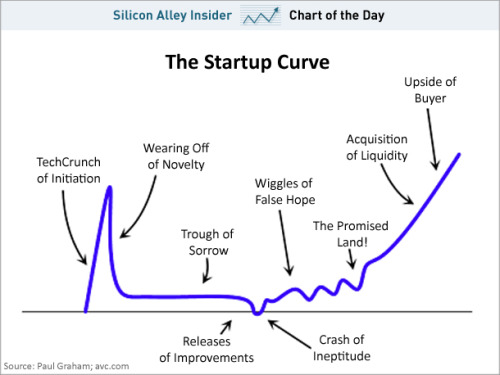
The Startup Curve designed by Paul Graham of Y Combinator
Entertainment
Infographic: How Social Media Sites Make Their Money
Infographic: The Neurology Of Gaming
Google now has street view of the Amazon basin.
5 Ways to Beat Old-School Games Using Math
What do all the controls in an airplane cockpit do?
Gadgets
Everything you need to know about the new iPad
News
The FBI fails to break through a pimp's Android pattern lock, serves Google warrant
Study reveals Americans lost $30 billion worth of mobile phones last year
This American Life retracts episode on Apple and Foxconn
Reading & Discussion
5 Things I Learned About Entrepreneurship From Y Combinator's Paul Graham
The Origins of Futurism
Where’s _why? What happened when one of the world’s most unusual, and beloved, computer programmers disappeared.
Resources & Software
Bouncr is a service that provides free, short email addresses that automatically forward to your real email address. If a bouncr email address begins receiving unwanted messages, the user can simply delete the account.
The Hacker Shelf is nice crowd-sourced guide to (legally) free books on various computational and mathematical subjects. The topics page gives you an idea of the breadth of material available.
Software
Attacking the Washington, D.C. Internet Voting System (PDF). "When we inspected the terminal server’s logs, we noticed that several other attackers [from Iran, New Jersey, India, and China] were attempting to guess the SSH login passwords." J. Alex Halderman, a computer scientist at the University of Michigan, describes how thoroughly he and his team were able to penetrate a pilot Internet voting system run by the District of Columbia, as part of an open public test in 2010. An earlier report on the attack.
Wednesday, March 7, 2012
Media: How Newspapers are Build Digital Revenue
Pew Research’s Project for Excellence in Journalism just released “The Search for a New Business Model,” a study “which combines detailed proprietary data from individual
newspapers with in-depth interviews at more than a dozen major media
companies” in order to understand how newspapers are digitally
innovating or otherwise trying to stymie their rapidly disappearing
print revenues. The study reveals just how abysmal the on-going efforts of newspapers really are.
Here’s the long and short of the article:
Here’s the long and short of the article:
- Digital revenues aren’t even close to covering print losses. For every $11 in print revenue, papers brought in $1 in digital revenue. Put a more depressing way: for every $1 gained in digital $7 are lost in print revenue.
- Newspapers don’t know how to sell digital advertising. Papers are barely selling targeted advertising. Instead, they choose (or only know how) to sell discrete display advertising campaigns. Such campaigns cannot scale to the scale of their audience and reduce the value of digital sales efforts by a factor or two.
- Newspapers are unable to hire digital talent. The majority of executives said it’s almost impossible to hire digitally fluent sales people, due to newspapers’ bad digital repuations. Further, even if they can hire digital talent they haven’t figured out how to integrate digital sales people with their traditional sales personnel.
- Newspapers don’t want to think about digital. A surveyed executive worries that they spend too much time working on digital, “We spend 90% of our time talking about 10% of our revenue.” A number of executives expressed concern that they have “too many people-whether it be in the newsroom, the boardroom or on the sales staff-who were too attached to the old way of doing things.”
Wednesday, February 15, 2012
Tech Links: February 15, 2012
Source: Business Insider
News
With the fight against SOPA and PIPA, hacktivism has gone mainstream. Along with Anonymous' fight against such organizations as Scientology, white supremecists, and child pornographers, their work against laws that would censor the Internet made the news. The hacktivists' trend towards self-policing also helps quell questions about their motivations.
Entertainment
Inforgraphic: Robot App StoreGoogle's answer to TED talks has gone live. Solve For X, a "forum to encourage and amplify technology-based moonshot thinking and teamwork," currently contains links to YouTube videos from the likes of Neal Stephenson, Rob McGinnis, and Privahini Bradoo. Videos range from 10 to 20 minutes in length.
Reading
Open Source for You, or "Your Day Job Sucks, Make Programming Fun Again". Stephen McDonald, creator of Mezzanine, shares his experience of "what it's like contributing to open source".The "visible web" is what you can find using general web search engines. It's also what you see in almost all subject directories. The "invisible web" is what you cannot find using these types of tools. It's the internet that Google doesn't show us; some of it dull, some of it private, some of it deliberately hidden.
Is Webkit, the web browser engine used by Safari and Chrome, turning into IE6? Concern is growing that reliance on proprietry CSS features marked by vendor prefixes could be breaking the web.
Why We Need a New Definition of ‘PC’
Resources & Tools
Is it Old? Before you make a complete fool of yourself when you send a link to your friends, colleagues or twitter followers, enter it here to make sure it's fresh enough.OneSwarm is a privacy preserving BitTorrent client that offers permissions for restricting access to shared content and sharing without attribution, with the anonymity being provided by fellow OneSwarm peers routing transfers.
Thursday, February 9, 2012
Tech Links: February 9, 2012
News
British children feel 'sad' without internet connection
Entertainment
10 Valentine’s Day Cards for Your Special Tech Geek
Reading
Alan Turing, British code-breaker during WWII, imminent computer scientist, and much else has been denied a posthumous pardon from the British government for his 1952 conviction on charges of "Gross Indecency" because of his homosexuality. The pardon had been called for by MP John Leech, and a online petition was started in December 2011. A public apology to Turing for his treatment post-conviction (chemical castration through estrogen injections) was rendered in 2009 by Prime Minister Gordon Brown.
Programming is the new High School Diploma
Think Facebook's $100 Billion Valuation Is Nuts? Read this.
Why William Gibson Distrusts Aging Futurists’ Nostalgia
Resources & Tools
Tribler Makes BitTorrent Impossible to Shut Down
Tutorials
How to See When Someone Unfriends You on Facebook
Tuesday, February 7, 2012
Tech Links: February 7, 2012
Breaking down Facebook’s initial public offering
Infographic: The Day the Internet Stood Still
Google wants to make sci-fi a reality with “Solve for X,” a conference for radical tech ideas
Hacker group Anonymous joined the FBI - Scotland Yard conference call coordinating their strategy against Anonymous. Call recording is now on YouTube with some suspect names bleeped.
How (and why) to set up Google Cloud Print.
Professor Thrun has quit Stanford and will be running a 7-week course on how to build a search engine to anyone with or without previous programming experience. While the reasons why Professor Thrun has quit Stanford is unclear, it is amazing he is equipping, and empowering, so many people with computer programming skills and fundamentally changing the dynamics of how higher education is delivered. For anyone interested, his course is starting in February 2012 and you can sign up at Udacity.com.
WAT is a lightning talk by Gary Bernhardt from CodeMash 2012, on the peculiarities of some popular scripting languages.
You will never kill piracy and piracy will never kill you.
Thursday, February 2, 2012
News: From hot stuff to flameout
If recent tech IPOs are an indicator, Facebook should beware the dangers of overhype. Julie Cohn explains:
A sampling of IPOs from the last year reveals that almost all major new tech offerings soared on overheated initial expectations at first, but quickly deflated thereafter. Reports surfaced late yesterday that said Facebook is expected to file paperwork indicating it plans to raise $5 billion using five banks as underwriters, led by Morgan Stanley.
Tech Links: February 2, 2012
News: Steve has mentioned this, and I've pointed out relateed news stories in the past month, but it looks like Facebook's IPO could come next week. The initial value could be $100 billion. Goldman-Sachs could be significant in the IPO. I just wish I wasn't using "could" - the IPO seems very probable, but no word is coming from Facebook. Update! People are expecting the IPO to have a twist as Zuckerberg does something that doesn't follow traditional wisdom. The fallout is going to have repercussions.
Find out how old Google thinks you are.
Future Shock (2, 3, 4, 5) is a glimpse at society on the precipice of the information age, in this 1972 documentary based on the Alvin Toffler classic about the world gone mad, due to technology and computers. Narrated by Orson Welles.
Infographic: Technology Use On The College Campus
It's now even harder to get noticed on the ol' Tube of You, as One Hour Per Second illustrates. One hour of video is uploaded to YT every second.
One in three teens has shared a password with a friend or significant other.
The U.S. National Security Agency (NSA) has begun releasing Security-Enhanced Android patches and tools, which port their Security-Enhanced Linux tools to Android devices. SEAndroid and SELinux provide mandatory access control designed to limit the amount of damage that rogue or exploited software can do. There was a talk about this at the Linux Security Summit in September 2011 which spawned various news stories. See the Unofficial and Official SELinux Intros/FAQs.
Why History Needs Software Piracy: How copy protection and app stores could deny future generations their cultural legacy.
Why should we stop online piracy?
Friday, December 9, 2011
Infographic: Portable Game Revenue
“The days of paying $25, or more, for a cartridge at a retail store may soon end,” says Flurry. Bad news for Nintendo & Sony, but great news for hot mobile games companies like the one I work for, Backflip Studios. Backflip is a small, 30-person, highly profitable company with over 150 million downloads, about 30 million active players per month, and we’re growing like crazy thanks to distribution through Apple and Android devices.
Infographic: Facebook IPO
Who would win big if Facebook goes public? The company is notoriously tight-lipped about who owns what, but here is our educated guess compiled from various news reports and David Kirkpatrick’s book “The Facebook Effect.”
Labels:
business,
infographic,
internet,
news,
social media
Subscribe to:
Posts (Atom)


